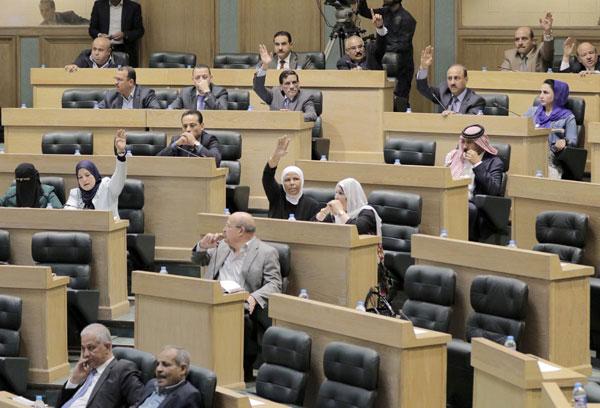You are here
Ensour says constitutional amendments ‘progressive’
By Raed Omari - Apr 19,2016 - Last updated at Apr 19,2016

Lawmakers attend a Lower House session on Tuesday (Petra photo)
AMMAN — Prime Minister Abdullah Ensour on Tuesday described the 2016 constitutional amendments as “progressive”, aiming at enhancing the principle of separation of powers.
Responding to MPs’ notes on the new constitutional amendments during a Lower House session, Ensour added that banning persons with dual nationalities from holding a parliamentary or ministerial post is something “uncommon in fully fledged democracies”.
Some of the 80 lawmakers who took the podium Tuesday criticised the new amendment to Article 75 of the Constitution under which the provision banning a person with a dual nationality from becoming a deputy, senator, minister or a senior official was scrapped.
The provision was added in 2011.
Those opposing the amendment argued that a person with a dual nationality cannot be “fully loyal to one country”.
“When I was a lawmaker [in the 16th Parliament], I myself was supportive of banning persons with dual nationalities from holding senior legislative and official posts. But such a thing is not a practice in established democracies,” Ensour told MPs.
The House referred the 2016 constitutional amendments to its legal committee for review.
On Monday, the Cabinet endorsed amendments to five articles of the Constitution.
As reworded by the Council of Ministers, a new paragraph was added to Article 40 of the Constitution to read: “Despite what is stated in Paragraph A, the King shall exercise his powers individually and appoint the Crown Prince, the Regent, Senate president and members, and members of the Constitutional Court, president of the Higher Judicial Council, the army’s chairman of the Joint Chiefs-of-Staff and the General Intelligence Department and Gendarmerie Department directors.”
The change concerns the naming of the Regent, which, under the amendment, does not need a recommendation by the Cabinet and the appointment of the Gendarmerie chief. The power to appoint the three top officers, end their services and accept their resignation is exclusively vested in the King, as detailed in Article 127.
Paragraph A of the said article reads: “The King shall exercise the powers vested in him by Royal Decree. Every such Decree shall be countersigned by the prime minister and the minister or ministers concerned. The King expresses his concurrence by placing his signature above the said signatures.”
The Cabinet also reworded Article 50 of the Constitution, removing the death of the prime minister as one of the cases when the government has to immediately resign.
The Cabinet added a new paragraph that reads: “In case of death of the prime minister, the government remains in office and will be headed by his deputy or the minister with the oldest term until a new government is formed.”
If passed by Parliament, Article 50 will read: “Upon the resignation of the prime minister, or his dismissal, all ministers shall be considered as having automatically resigned.”
The Cabinet also changed Article 96 of the Constitution, extending the term of the House speaker to two calendar years instead of one.
The said article, if passed by lawmakers, will read: “The Chamber of Deputies shall elect its speaker at the beginning of each ordinary session for a period of two calendar years, but he may be re-elected.”
Related Articles
AMMAN — The Cabinet on Monday endorsed amendments to five articles of the Constitution, one of which allows dual nationality for occupiers o
AMMAN — The Senate's legal committee on Thursday endorsed the draft constitutional amendments as sent by the Lower House during a meeting ch
AMMAN — A Royal Decree was issued on Wednesday, endorsing the amendments to the Constitution for 2016, a Royal Court statement said. T












